沪教版英语6B单元知识梳理
- 格式:doc
- 大小:171.00 KB
- 文档页数:26
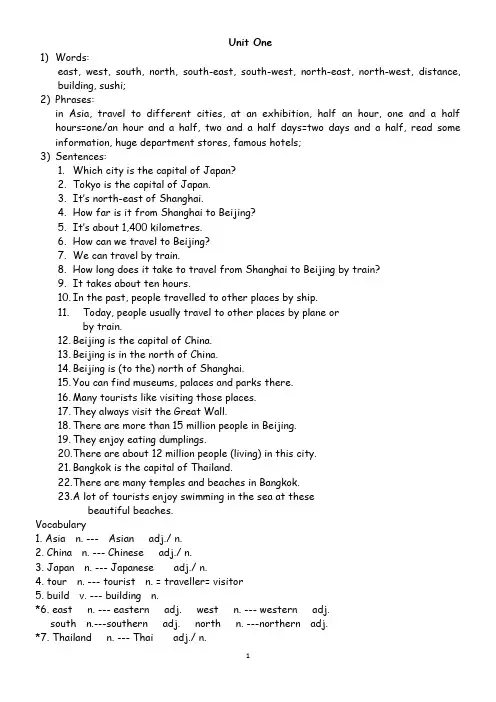
Unit One1)Words:east, west, south, north, south-east, south-west, north-east, north-west, distance, building, sushi;2)Phrases:in Asia, travel to different cities, at an exhibition, half an hour, one and a half hours=one/an hour and a half, two and a half days=two days and a half, read some information, huge department stores, famous hotels;3)Sentences:1.Which city is the capital of Japan?2.Tokyo is the capital of Japan.3.It’s north-east of Shanghai.4.How far is it from Shanghai to Beijing?5.It’s about 1,400 kilometres.6.How can we travel to Beijing?7.We can travel by train.8.How long does it take to travel from Shanghai to Beijing by train?9.It takes about ten hours.10.In the past, people travelled to other places by ship.11.Today, people usually travel to other places by plane orby train.12.Beijing is the capital of China.13.Beijing is in the north of China.14.Beijing is (to the) north of Shanghai.15.You can find museums, palaces and parks there.16.Many tourists like visiting those places.17.They always visit the Great Wall.18.There are more than 15 million people in Beijing.19.They enjoy eating dumplings.20.T here are about 12 million people (living) in this city.21.Bangkok is the capital of Thailand.22.T here are many temples and beaches in Bangkok.23.A lot of tourists enjoy swimming in the sea at thesebeautiful beaches.Vocabulary1. Asia n. --- Asian adj./ n.2. China n. --- Chinese adj./ n.3. Japan n. --- Japanese adj./ n.4. tour n. --- tourist n. = traveller= visitor5. build v. --- building n.*6. east n. --- eastern adj. west n. --- western adj.south n.---southern adj. north n. ---northern adj.*7. Thailand n. --- Thai adj./ n.*8. different adj. --- difference n.Grammar1. Which city …? e.g. Which city is the capital of Canada?2. It’s (to the) north-east of Shanghai.*c.f. in/ on/ toe.g. Shanghai is in the south-east of China.Jiangsu province is on the north of Shanghai.Japan is to the east of China.3. How far…from … to…?e.g. How far is it from your home to school?* c.f. How far it is to travel from Shanghai to the South Pole!4. kilometre = km metre = m5. How…? 提问出行方式 e.g. How can we travel?6. How long …?e.g. How long does it take to travel from London to Paris?7. In the past, 在过去Today, 现如今8. by ship = by seaby plane=by air=by aeroplane=by airplane9. travel to other places = * travel from one place to another10. information n.a piece of informationsome informationa lot of information= a huge amount of information11. palace n. the Summer Palacethe Palace Museumthe Children’s Palace12. more than = over less than/ fewer than13. like/ love/ enjoy + doinggo/ start/ begin + doing14. There are about 12 million people (living) in this city.= About 12 million people live in this city.。
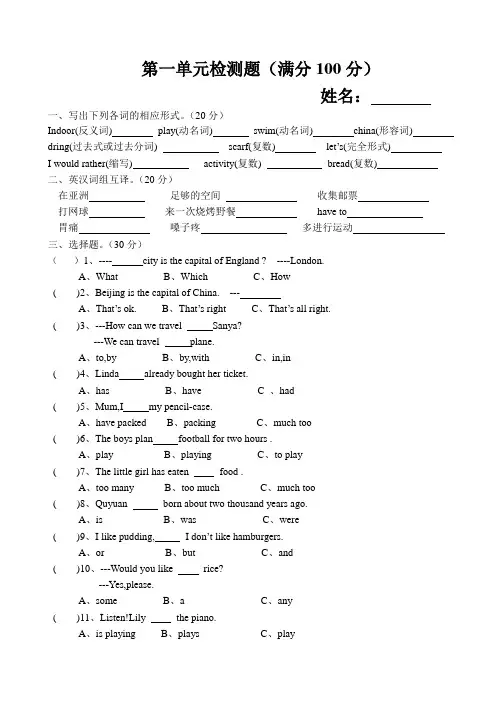
第一单元检测题(满分100分)姓名:一、写出下列各词的相应形式。
(20分)Indoor(反义词) play(动名词) swim(动名词) china(形容词) dring(过去式或过去分词) scarf(复数) let’s(完全形式)I would rather(缩写) activity(复数) bread(复数)二、英汉词组互译。
(20分)在亚洲足够的空间收集邮票打网球来一次烧烤野餐have to胃痛嗓子疼多进行运动三、选择题。
(30分)()1、---- city is the capital of England ? ----London.A、WhatB、WhichC、How( )2、Beijing is the capital of China. ---A、That’s ok.B、That’s rightC、That’s all right.( )3、---How can we travel Sanya?---We can travel plane.A、to,byB、by,withC、in,in( )4、Linda already bought her ticket.A、hasB、have C 、had( )5、Mum,I my pencil-case.A、have packedB、packingC、much too( )6、The boys plan football for two hours .A、playB、playingC、to play( )7、The little girl has eaten food .A、too manyB、too muchC、much too( )8、Quyuan born about two thousand years ago.A、isB、wasC、were( )9、I like pudding, I don’t like hamburgers.A、orB、butC、and( )10、---Would you like rice?---Yes,please.A、someB、aC、any( )11、Listen!Lily the piano.A、is playingB、playsC、play( )12、Mar white always has toothache , she should eat sweet food.A、moreB、lessC、enough( )13、They enjoy films.A、seeB、seeingC、to see( )14、Kitty and May going to New York this weekend.A、isB、amC、are( )15、There 45 students in our classroom.A、isB、amC、are四、从方框中选择正确词语填空。
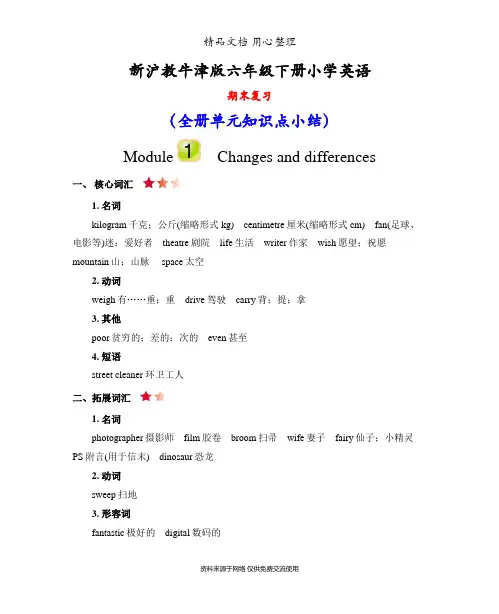
新沪教牛津版六年级下册小学英语期末复习(全册单元知识点小结)Module Changes and differences一、核心词汇1. 名词kilogram千克;公斤(缩略形式kg)centimetre厘米(缩略形式cm)fan(足球、电影等)迷;爱好者theatre剧院life生活writer作家wish愿望;祝愿mountain山;山脉space太空2. 动词weigh有……重;重drive驾驶carry背;提;拿3. 其他poor贫穷的;差的;次的even甚至4. 短语street cleaner 环卫工人二、拓展词汇1. 名词photographer摄影师film胶卷broom扫帚wife妻子fairy仙子;小精灵PS附言(用于信末)dinosaur恐龙2. 动词sweep扫地3. 形容词fantastic极好的digital数码的4. 副词online在线地;在线的5. 代词themselves他们自己;她们自己;它们自己6. 其他taller更高的7. 短语go fishing去钓鱼enjoy oneself玩得愉快;得到乐趣get … in收割street sweeper扫地车by hand用手right away立即;马上in a short time很快head teacher 校长 a piece of一张;一片have a picnic去野餐better and better越来越好三、核心句型1. I’m 150 centimetres tall. 我身高150厘米。
解读:这是介绍身高的句型。
“主语 + be动词 + 数字 + 长度单位(+ tall).”可以用来介绍某人的身高。
举一反三: My cousin is 154 centimetres tall. 我的堂弟身高154厘米。
Jim is 149 centimetres tall. 吉姆身高149厘米。
2. There are a lot of tall buildings in the city. 城市里有很多高大的建筑物。
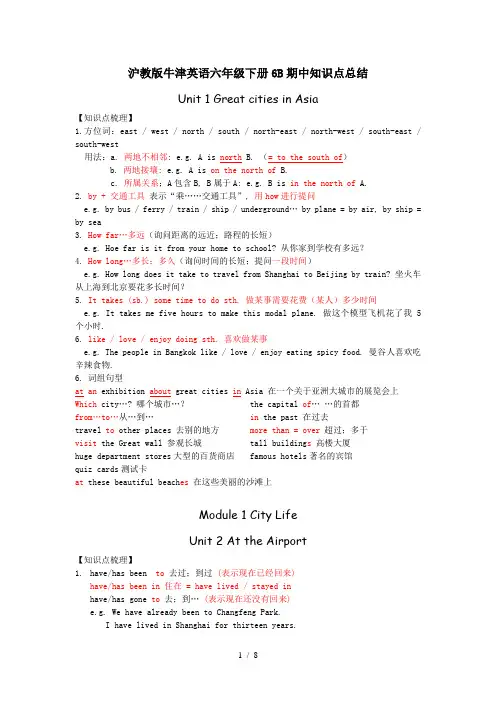
沪教版牛津英语六年级下册6B期中知识点总结Unit 1 Great cities in Asia【知识点梳理】1.方位词:east / west / north / south / north-east / north-west / south-east / south-west用法:a. 两地不相邻: e.g. A is north B. (= to the south of)b. 两地接壤: e.g. A is on the north of B.c. 所属关系;A包含B, B属于A: e.g. B is in the north of A.2. by + 交通工具表示“乘……交通工具”,用how进行提问e.g. by bus / ferry / train / ship / underground… by plane = by air, by ship = by sea3. How far…多远(询问距离的远近;路程的长短)e.g. Hoe far is it from your home to school? 从你家到学校有多远?4. How long…多长;多久(询问时间的长短;提问一段时间)e.g. How long does it take to travel from Shanghai to Beijing by train? 坐火车从上海到北京要花多长时间?5. It takes (sb.) some time to do sth. 做某事需要花费(某人)多少时间e.g. It takes me five hours to make this modal plane. 做这个模型飞机花了我5个小时.6. like / love / enjoy doing sth. 喜欢做某事e.g. The people in Bangkok like / love / enjoy eating spicy food. 曼谷人喜欢吃辛辣食物.6. 词组句型at an exhibition about great cities in Asia 在一个关于亚洲大城市的展览会上Which city…? 哪个城市…?the capital of……的首都from…to…从…到…in the past 在过去travel to other places 去别的地方more than = over超过;多于visit the Great wall 参观长城tall building s高楼大厦huge department stores大型的百货商店famous hotels著名的宾馆quiz cards测试卡at these beautiful beach es在这些美丽的沙滩上Module 1 City LifeUnit 2 At the Airport【知识点梳理】1.have/has been to去过;到过(表示现在已经回来)have/has been in 住在 = have lived / stayed inhave/has gone to 去;到…(表示现在还没有回来)e.g. We have already been to Changfeng Park.I have lived in Shanghai for thirteen years.Where is Henry? He has gone to Japan. H2.already 已经(多用于肯定句;放于动词前)yet 迄今;还(多用于疑问句和否定句;放于句末)just 刚刚 (用法和位置和already相同)e.g. I have already been to Lily’s home.Have you been to Lily’s home yet?No, I haven’t been to her home yet.3.plan to do计划做……e.g. Tom is planning to visit Rome this Spring Festival. 汤姆正计划今年春节到罗马旅行.4.leave for 出发去……动身去……leave A 离开A地 e.g. He will leave Shanghai.leave for B 出发去B地 e.g. He will leave for Tokyo.leave A for B 离开A地去B地e.g. He will leave Shanghai for Tokyo.5.arrive + in大地方 (如国家、城市等范围较大的地方) e.g.arrive in Chinaarrive + at小地方 (如车站、学校等小范围的地方) e.g. arrive at the airport 【近义】get to, reach到达6.have to do…不得不做… (否定don’t have to do)e.g. I have to say it again. 我不得不再说一遍.7.enough space足够的空间space“空间”;不可数名词enough 修饰名词时前置;修饰形容词副词时后置 e.g. enough money, good enough 8.live / stay …for…在…住/待…(时间)for +一段时间;多与现在完成时连用表示动作从过去延续到现在的一段时间;并用how long提问. e.g. We have learned English for six years. 我们学习英语已经六年了.9.have / has got “有、拥有”否定形式haven’t/ has n’t got…疑问形式Have/ Has…got…?10.too many + 可数名词复数“太多的…” too much + 不可数名词“太多的…”11.plenty of “许多;大量”;后面可跟不可数名词或可数名词复数12.重要词组句型this Sunday live in Los Angelesone and a half hour s at eleven thirty in the morninglook at this sign over therebuy sb. sth. =buy sth. for sb. departure time / arrival timewrite down one’s address What time…?Module 1 City LifeUnit 3 Dragon Boat Festival【知识点梳理】1.know something about the Dragon Boat Festival了解一些关于端午节的知识know about 知道/了解关于……的事情know认识2.His job was to give advice to the king. 他的工作是给国王出谋划策.⑴ be +to do, 不定式做表语,表示主语和表语在概念上是等同的.e.g. His plan is to clean the room. 他的任务是打扫房间.My wish is to be a doctor. 我的愿望是称为一名医生.⑵ give sth. to sb. = give sb. sth. 给某人某物⑶ advice “劝告, 忠告”, 不可数名词a piece of advice 一条建议some advice 一些建议give advice to sb. 想某人提出建议take sb’s advice 采纳某人的建议3.listen to在本文中指“听从, 听信”e.g. She never listens to me. 她从不听我的话.4.in danger 在危险中danger n. 危险dangerous adj. 危险的5.would like to do想要做……= want to do6.---Would you like some…? 表示“你想要……吗?”;用于询问对方的意见.---Yes, please. (肯定回答) / No, thanks. (否定回答)ter adv. 后来;以后late adj. 晚的;迟的e.g. I'll tell you later. 我以后再告诉你.He was late for school. 他上学迟到了.8. a salty rice dumpling with / without meat 一只(没)有肉的咸粽子with 表示“有”;without表示“没有”with还有“和……”、“用”等意思e.g. I write the report with my pen. 我用我的新钢笔写报告.She lives with her son.她和儿子住在一起.9.I like salty rice dumplings, but I don’t like sweet ones. 我喜欢咸粽子;但我不喜欢甜粽子.⑴ one 用来指代一个人或事物;而ones用来指代一些人或事物.⑵ but但是;表示意思的转折.10.would rather do 宁愿做……would rather not do 宁愿不做……e.g. He would rather stay at home at weekends. 他宁愿周末呆在家.11.the fifth day of the fifth lunar month 农历五月初五在英语中;用序数词表达农历的第几个月和第几天.12.重要词组句型the story of the festival be borntwo hundred years ago jump into a riverthe fifth day of the fifth lunar month of that year on that dayeat rice dumplings and have dragon boat races to remember himModule 1 City LifeUnit 4 Staying Healthy【知识点梳理】1.like / love / enjoy doing 喜欢做……e.g. Many children like/love/enjoy eating fried food. 许多小孩喜欢吃油炸食品.2.stay healthy 保持健康stay 在本课中“意为”保持;为联系动词;后面只能跟形容词.e.g. I hope the weather will stay fine.我希望天气能持续放晴.3.health n. 健康healthy adj. 健康的unhealthy adj. 不健康的e.g. health problems 健康问题healthy / unhealthy food (不)健康食品4.Work and play, we love both. 工作与学习;我们都喜欢.both pron. 意为“两者(都)……”;在此句中指的是学习和工作这两件事.e.g. Both of the twins like doing puzzles. 这对双胞胎都喜欢玩拼图.5.forget doing 忘记做过……(已做)forget to do忘记去做……(未做)【反义】 remember;用法与foeget相同e.g. I forgot posting the letter. 我忘了信已寄出.Don't forget to post the letter. 别忘了去寄信.6.What’s your favourite…?你最喜欢的……是什么?(what用来询问具体的信息)e.g. What should I do to stay healthy? 要保持健康;我应当做些什么?7.I like playing football in the playground. 我喜欢在操场上踢足球.⑴“在操场上”可以用 in / on the playground 表示.⑵ 定冠词the的用法:a. 在球类运动前不加定冠词the e.g. play football / basketball / tennis,etc.b. 在乐器前必须加定冠词the e.g. play the piano / violin, etc.c. 在watching television中;不加定冠词the8.Why…? 用于询问原因;回答用 (It’s) becausee.g. —Why do I always feel tired, Mum?—It’s because you watch too much television.9.have a headache 头痛“身体部位+ache”表示疼痛.此处的have意为“患病;得病”e.g. have a stomach ache 胃痛have toothache 牙痛其他身体不适的表达有: have a cold 感冒have a fever 发烧 have a sore throat 喉咙痛10.too much 太多+不可数名词too many 太多+可数名词复数e.g. Don’t drink too much cola. 不要喝太多的可乐.Too many sweets are bad for your teeth. 吃太多糖对你的牙齿不好.11.too little 太少+不可数名词too few 太少+可数名词复数可以用not...enough (修饰可数或不可数名词)结构改写句子.e.g. You eat too little fruit. = You don’t eat enough fruit.12.less 更少+不可数名词(less是little的比较级)fewer 更少+可数名词(fewer是few的比较级)more 更多+可数名词、不可数名词(more是many、much共同的比较级)e.g. You should have less meat, fewer soft drinks and do more exercise. 你应该少吃肉;少喝软饮料;多做运动.13.enough + 名词“足够的……”形容词/ 副词 +enough “足够地……”e.g. We have enough chairs for everyone. 我们有足够的椅子让大家坐.They cannot walk fast enough. 他们走得不够快.14.How often……?“多久一次”;用于对时间频率提问.e.g. How often do you go to see a film? 你多久看一次电影?【比较】how often 与 how many timeshow often 提问“频率次数+时间范围”how many times 提问“频率次数”e.g. —How often do you exercise? —Twice a week.—How many times have you been there? —Twice.15.once 一次 twice 两次三次及以上: 数字+timese.g. I see them once every two months. 我每两个月与他们见一次面.I go to the library three times a month. 我一个月三次去图书馆.16.practise doing…练习做……;训练……e.g. She practises dancing every afternoon. 她每天下午练习跳舞.17.help do the housework 帮忙做家务help sb. (to) do sth. 帮某人做某事= help sb. with sth. 帮某人某事e.g. Ben helps me learn English.Ben helps me with my English.18.exercise n. & v. 锻炼(身体);运动;练习e.g. You don’t do enough exercise. 你锻炼不够.(“锻炼”;不可数名词)You need do more maths exercises. 你需要做更多的数学练习.(“练习”;可数名词)I think you should exercise more.我认为你应该多运动运动.19.重要的词组句型really love musicThat’s my favourite indoor / outdoor activityI’m afraid.should wear more clotheswatch too much televisionnot…enoughwatch less televisionhave enough exercisego to bed lateonce / twice /…times a day/week/month/yearneverUnit 5 What will I be like?【基础知识】1.What will I be like? = How will I be? 我将是怎么样的?一般将来时:用于表示将来某个时间发生的动作或状态.常与tomorrow, next +时间词;in+一段时间, in the future等连用.其动词形式有will/shall + do 或 is/am/are going to + do(动词原形)e. g. There is going to be/ will be a sports meeting in our school next week.下周我校将有一个运动会.I will possibly be a doctor in the future.将来我可能是一个医生.possibly ad.可能地—possible a.可能的2.stand in front of a magic camera 站在魔幻照相机前 stand—stood—stood3.take a photograph with it 用它拍一张照片take—took—taken4.wait for the red light 等待红灯5.look for the “START” button 寻找“开始”按钮6.put in a ¥20 note 放入一张20元面值的纸币7.press the “START” button 按“开始”按钮8.read the note on the back 阅读背面的注释9.in 15 year s’ time在十五年以后(多与将来时连用);提问用 How soon10.be 165 centimetres tall 将是165厘米高, 提问用How tall are you?或What’s yourheight?11.weigh 55 kilograms 称得55公斤;提问用How much do you weigh? 或What’s yourweight?或者How heavy are you? 回答也可用 I am 55 kilograms heavy.12.an astronaut 一个宇航员 grow bigger长得更大13.be good at singing 擅长唱歌 be good at cooking擅长烹饪be good at sports 擅长运动 be good at Chinese擅长英语be poor at English不擅长英语be good at/ be poor at(doing) sth. 擅长于/不擅长于(做)某事14.wear a pair of glasses 戴一副眼镜 wear穿着;戴着强调状态;wear—wore—wornput on穿上;戴上强调动作 put on your coat 穿上你的大衣15.love helping people 爱帮助人 love listening to music 爱听音乐love taking photograph 爱拍照片16.be good-looking 是好看 be strong 是强壮的 be slim是苗条的17.in a bakery 在面包房 a baker一个面包师 bake some bread烤一些面包18.read and write a lot读和写许多19.a report on/about my future 一个关于我的将来的报告report an accident报告一起事故 a reporter一个记者20.would like to be a doctor想要做一个医生=want to be a doctor21.fly a spacecraft驾驶一架航天飞机 fly—flew—flown22.在夜晚回来23.learn how to make sick people better 学会怎样使生病的人更好learn to do sth. 学会做某事 learn—learnt—learnt24.have to practice English more 不得不更多地练习英语practice doing sth. 练习做某事v. (AE)练习 = practise v. (BE)do much practice做许多练习n. 练习Practice makes perfect. 熟能生巧.have to do sth. 表示“不得不做某事”;意思与must do sth.相近;但用法上有一定区别.have to do sth. 有时态的变化;因此否定句与疑问句需要助动词构成.肯定句:He has to do a lot of homework. 他不得不做许多回家作业.否定句:He doesn’t have to do much homework. (doesn’t have to= doesn’t need to =needn’t)一般疑问句:Does he have to do a lot of homework?25.连词主要连接两个简单句.并列连词有and并且;和; but但是; or或者;否则的话; so所以; for因为.I like eating fruit and vegetables and I always eat plenty of fruit and vegetables.我喜欢吃水果和蔬菜;并且我总是吃大量的水果和蔬菜.Kitty likes dogs, but she doesn’t like cats.凯蒂喜欢狗;但是她不喜欢猫.Hurry up, or you will be late for school. 赶快;否则的话你将会上学迟到.He was ill, so he asked for sick leave. 他病了;所以他请病假了.Tom was fat, for he ate too much unhealthy food. 汤姆胖;因为他吃了太多不健康食品.【词性转换】possible adj. --possibly adv. --impossible adj.heavy adj. 比较级 heavier 最高级 the heaviestslim adj. 比较级 slimmer 最高级 the slimmestbeautiful adj. 比较级 more beautiful 最高级 the most beautiful report v. -- reporter n.bake v. -- baker n. --bakery n.practice n. --practise v.be good at/ be poor at(doing) sth. 擅长于/不擅长于(做)某事【动词结构】V+doinglove/like/enjoy/practise doinglove helping people 爱帮助人like listening to music 爱听音乐enjoy taking photograph 爱拍照片practise swimming 练习游泳V+ to dowould like to/want to/ learn how to/have towould like to be a doctor想要做一个医生=want to be a doctorlearn how to make sick people better学会如何使病人康复have to pracitse English more加强英语的操练【句型】一般将来时:用于表示将来某个时间发生的动作或状态.常与tomorrow, next +时间词;in+一段时间, in the future等连用.其动词形式有will/shall + do 或is/am/are going to + do(动词原形)* What will I look like?= How will I look?in 15 years’ time在十五年以后(多与将来时连用);提问用 How soonbe 165 centimetres tall 将是165厘米高, 提问用How tall are/will you?或What’s your height?weigh 55 kilograms 称得55公斤;提问用How much do/will you weigh? 或What’s your weight?6B 期中考试作文范文My Favourite CityShanghai is my favourite city. It is one of the biggest cities in China. It is in the east of China. You can see a lot of tall buildings, huge department stores and famous hotels there. There are about 22 million people in this city. They enjoy eating sweet food. (50 words)My Favourite FestivalI like the Dragon Boat Festival best. It is my favourite festival. The Dragon Boat Festival is on the fifth day of the fifth lunar month. Today, people usually eat rice dumplings and have dragon boat races on that day. People celebrate the Dragon Boat Festival to remember Qu Yuan. (50 words)My favourite Outdoor ActivityPlaying basketball is my favourite outdoor activity. I like it very much because it can help me to keep healthy. I usually play basketball in the playground in the P.E. lessons. I usually play basketball three times a week. When I play basketball, I feel very happy. Do you like playing basketball? (52 words)My Favourite Indoor ActivityMy favourite indoor activity is reading books. I like it very much because I can learn a lot from books. I usually read books at home. I usually read books after I finish my homework. I read all kinds of books. I read books almost every day. Do you like reading books? (52 words)Health RulesDo you want to stay healthy? If you want to keep healthy, please follow these rules. You should watch less television. You should eat less spicy food and fewer sweets. You should have enough exercise. You shouldn’t go to bed late. All in all, health is very important to everybody. (50 words)My Possible FutureI lik e reading books. I am good at writing. In 15 years’ time, I will possibly be a reporter. I will be 175 centimeters tall. I will weigh 60 kilograms. I am poor at taking photos. I have to learn to take photos. I will practise taking photos more. I will read and write a lot. (56 words)。
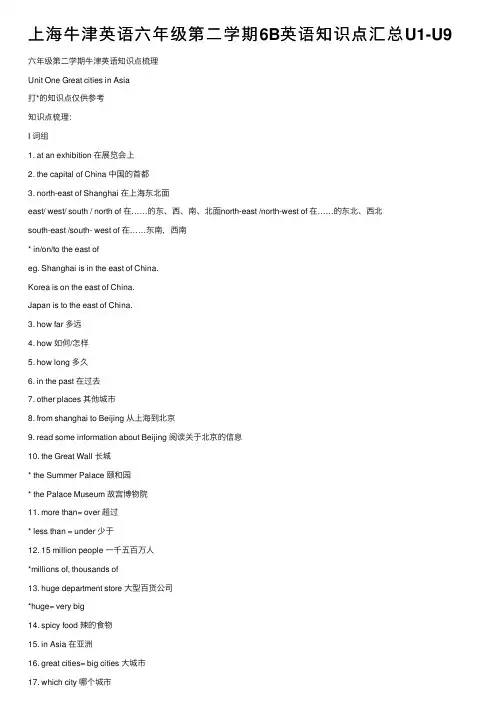
上海⽜津英语六年级第⼆学期6B英语知识点汇总U1-U9六年级第⼆学期⽜津英语知识点梳理Unit One Great cities in Asia打*的知识点仅供参考知识点梳理:I 词组1. at an exhibition 在展览会上2. the capital of China 中国的⾸都3. north-east of Shanghai 在上海东北⾯east/ west/ south / north of 在……的东、西、南、北⾯north-east /north-west of 在……的东北、西北south-east /south- west of 在……东南,西南* in/on/to the east ofeg. Shanghai is in the east of China.Korea is on the east of China.Japan is to the east of China.3. how far 多远4. how 如何/怎样5. how long 多久6. in the past 在过去7. other places 其他城市8. from shanghai to Beijing 从上海到北京9. read some information about Beijing 阅读关于北京的信息10. the Great Wall 长城* the Summer Palace 颐和园* the Palace Museum 故宫博物院11. more than= over 超过* less than = under 少于12. 15 million people ⼀千五百万⼈*millions of, thousands of13. huge department store ⼤型百货公司*huge= very big14. spicy food 辣的⾷物15. in Asia 在亚洲16. great cities= big cities ⼤城市17. which city 哪个城市18. by plane=by air; 乘飞机by ship=by sea; 乘船by train/ ferry 乘⽕车/ 渡轮19. That’s right. 对的。
![上海牛津英语六年级第二学期6B英语知识点汇总U1-U9[1]](https://uimg.taocdn.com/860e6756680203d8cf2f24cc.webp)
(直打版)上海牛津英语六年级第二学期6B英语知识点汇总U1-U9(word版可编辑修改)编辑整理:尊敬的读者朋友们:这里是精品文档编辑中心,本文档内容是由我和我的同事精心编辑整理后发布的,发布之前我们对文中内容进行仔细校对,但是难免会有疏漏的地方,但是任然希望((直打版)上海牛津英语六年级第二学期6B英语知识点汇总U1-U9(word版可编辑修改))的内容能够给您的工作和学习带来便利。
同时也真诚的希望收到您的建议和反馈,这将是我们进步的源泉,前进的动力。
本文可编辑可修改,如果觉得对您有帮助请收藏以便随时查阅,最后祝您生活愉快业绩进步,以下为(直打版)上海牛津英语六年级第二学期6B英语知识点汇总U1-U9(word版可编辑修改)的全部内容。
六年级第二学期牛津英语知识点梳理Unit One Great cities in Asia打*的知识点仅供参考知识点梳理:I 词组1。
at an exhibition 在展览会上2. the capital of China 中国的首都3. north-east of Shanghai 在上海东北面east/ west/ south / north of 在……的东、西、南、北面north—east /north—west of 在……的东北、西北south—east /south— west of 在……东南,西南* in/on/to the east ofeg. Shanghai is in the east of China.Korea is on the east of China.Japan is to the east of China。
3. how far 多远4。
how 如何/怎样5. how long 多久6. in the past 在过去7。
other places 其他城市8。
from shanghai to Beijing 从上海到北京9。
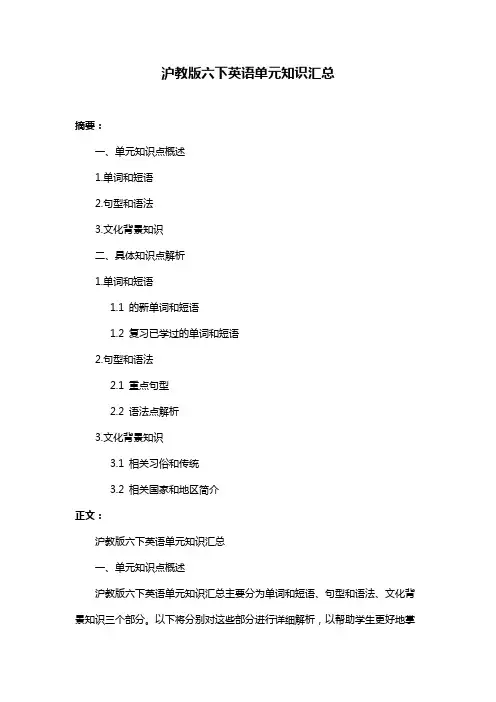
沪教版六下英语单元知识汇总摘要:一、单元知识点概述1.单词和短语2.句型和语法3.文化背景知识二、具体知识点解析1.单词和短语1.1 的新单词和短语1.2 复习已学过的单词和短语2.句型和语法2.1 重点句型2.2 语法点解析3.文化背景知识3.1 相关习俗和传统3.2 相关国家和地区简介正文:沪教版六下英语单元知识汇总一、单元知识点概述沪教版六下英语单元知识汇总主要分为单词和短语、句型和语法、文化背景知识三个部分。
以下将分别对这些部分进行详细解析,以帮助学生更好地掌握本册教材的内容。
1.单词和短语在本册教材中,我们学习了许多新单词和短语。
这些新单词和短语涵盖了各种场景和主题,如地点、运动、兴趣爱好等。
通过学习这些单词和短语,学生们可以丰富自己的词汇量,并在实际生活中运用到这些知识。
此外,本单元还复习了一些已学过的单词和短语。
这对于巩固学生的词汇基础具有重要意义,也为他们在后续的学习中运用这些词汇提供了便利。
2.句型和语法在本单元中,我们重点学习了若干句型和语法点。
这些句型和语法知识是英语学习的基础,对于提高学生的口语和书面表达能力具有重要意义。
3.文化背景知识沪教版六下英语教材在传授语言知识的同时,也注重培养学生的跨文化交际能力。
在本单元中,我们介绍了与课文内容相关的习俗和传统,以及一些国家和地区的简介。
通过这些知识,学生可以更好地了解英语国家的文化,为日后与外国朋友交流打下基础。
二、具体知识点解析1.单词和短语在本单元中,我们学习了许多新单词和短语。
例如:- 新单词:kilogram(千克)、centimetre(厘米)、fan(足球、电影等迷)、theatre(剧院)、life(生活)、writer(作家)等。
- 短语:do a lot of exercise(做大量的运动)、play basketball(打篮球)、after school(放学后)、play football(踢足球)、a football fan(足球迷)、go fishing(去钓鱼)、go to museums(去博物馆)等。
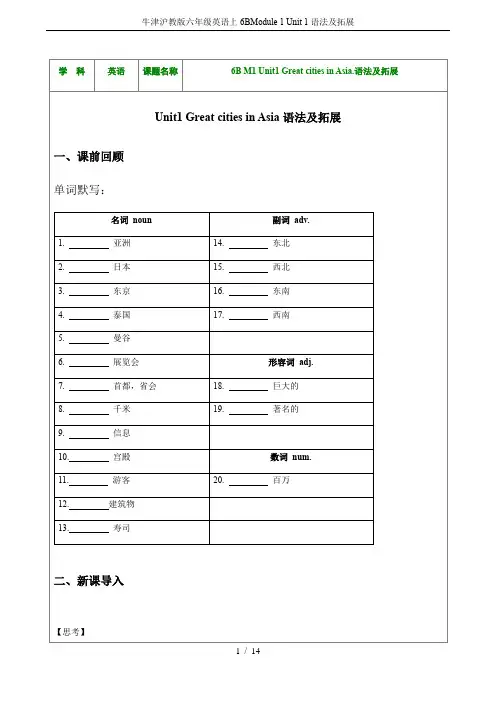
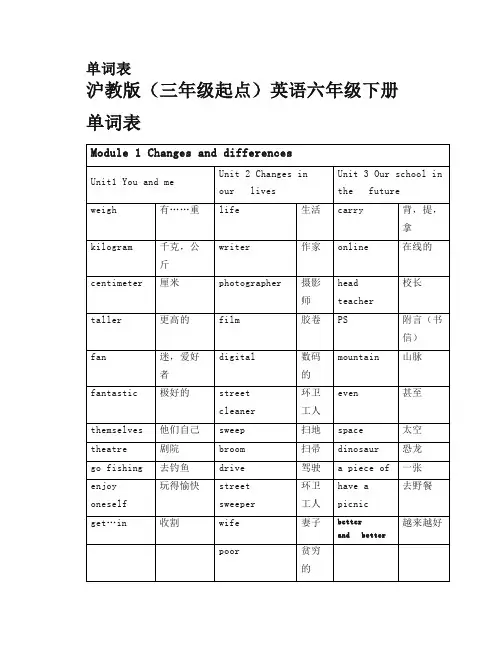
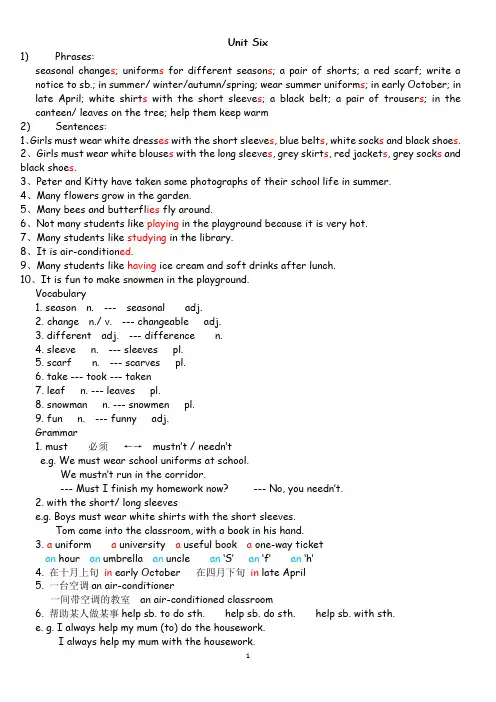
Unit Six1)Phrases:seasonal change s; uniform s for different season s; a pair of shorts; a red scarf; write a notice to sb.; in summer/ winter/autumn/spring; wear summer uniform s; in early October; in late April; white shirt s with the short sleeve s; a black belt; a pair of trouser s; in the canteen/ leaves on the tree; help them keep warm2)Sentences:1、Girls must wear white dress es with the short sleeve s, blue belt s, white sock s and black shoe s.2、Girls must wear white blouse s with the long sleeve s, grey skirt s, red jacket s, grey sock s and black shoe s.3、Peter and Kitty have taken some photographs of their school life in summer.4、Many flowers grow in the garden.5、Many bees and butterfl ies fly around.6、Not many students like playing in the playground because it is very hot.7、Many students like studying in the library.8、It is air-condition ed.9、Many students like having ice cream and soft drinks after lunch.10、It is fun to make snowmen in the playground.Vocabulary1. season n. --- seasonal adj.2. change n./ v. --- changeable adj.3. different adj. --- difference n.4. sleeve n. --- sleeves pl.5. scarf n. --- scarves pl.6. take --- took --- taken7. leaf n. --- leaves pl.8. snowman n. --- snowmen pl.9. fun n. --- funny adj.Grammar1. must 必须←→mustn’t / needn’te.g. We must wear school uniforms at school.We mustn’t run in the corridor.--- Must I finish my homework now? --- No, you needn’t.2. with the short/ long sleevese.g. Boys must wear white shirts with the short sleeves.Tom came into the classroom, with a book in his hand.3. a uniform a university a useful book a one-way ticketan hour an umbrella an uncle an‘S’an‘f’an‘h’4. 在十月上旬in early October 在四月下旬in late April5. 一台空调an air-conditioner一间带空调的教室an air-conditioned classroom6. 帮助某人做某事help sb. to do sth. help sb. do sth. help sb. with sth.e. g. I always help my mum (to) do the housework.I always help my mum with the housework.* Mary, help yourself to the food on the table.7. 使某人一直做某事keep sb. doing sth 使某人保持..状态keep sb./ spl. + adj.e. g. My father keeps me playing the piano all the time.My father always keeps me busy.The policemen help keep our city safe.8. in spring/ summer/ autumn/ winteron a hot summer day/ on a cold winter day/ on a rainy dayin January / in 2012/ in August, 2008on June 1st/ on the morning of April Foo l’s Day/on Sunday morning9. wear c.f. put one.g. My grandfather always wears his favourite hat.Alice put on her coat and went out.10. on the tree c.f. in the treee.g. You cannot see many leaves on the tree in winter.Look up! You can see a bird nest in the tree.11. A lot of students like studying in the library because it is air-conditioned.Why do many students like studying in the library?Not many students like playing in the playground because it is too hot.Why don’t many students like playing in the playground?。
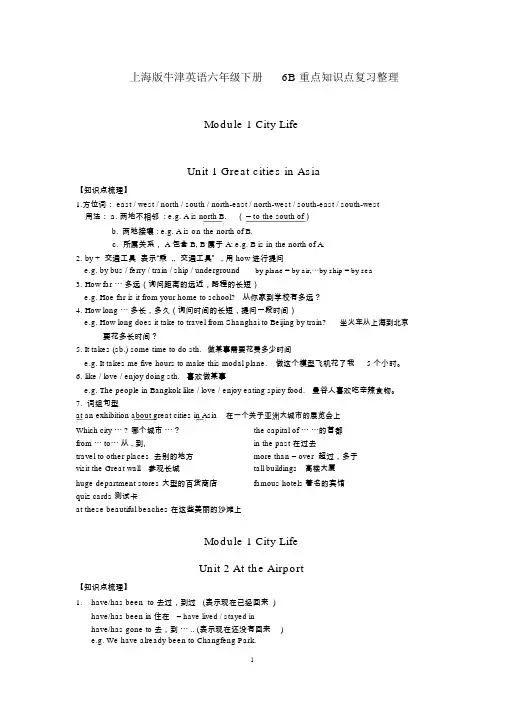
上海版牛津英语六年级下册6B 重点知识点复习整理Module 1 City LifeUnit 1 Great cities in Asia【知识点梳理】1.方位词: east / west / north / south / north-east / north-west / south-east / south-west用法: a. 两地不相邻 : e.g. A is north B.(=to the south of)b.两地接壤 : e.g. A is on the north of B.c.所属关系, A 包含 B, B 属于 A: e.g. B is in the north of A.2.by + 交通工具表示“乘 ,, 交通工具” , 用 how 进行提问e.g. by bus / ferry / train / ship / underground by plane = by air,⋯by ship = by sea3.How far ⋯多远(询问距离的远近,路程的长短)e.g. Hoe far is it from your home to school? 从你家到学校有多远?4.How long ⋯多长,多久(询问时间的长短,提问一段时间)e.g. How long does it take to travel from Shanghai to Beijing by train?坐火车从上海到北京要花多长时间?5. It takes (sb.) some time to do sth.做某事需要花费多少时间e.g. It takes me five hours to make this modal plane.做这个模型飞机花了我 5 个小时。
6.like / love / enjoy doing sth. 喜欢做某事e.g. The people in Bangkok like / love / enjoy eating spicy food. 曼谷人喜欢吃辛辣食物。
沪教版六下英语单元知识汇总【实用版】目录1.沪教版六下英语单元知识汇总概述2.六下英语单元知识分类2.1 词汇2.2 语法2.3 对话与情景交际2.4 阅读理解2.5 写作3.六下英语单元知识的重要性4.总结正文【沪教版六下英语单元知识汇总概述】沪教版六下英语单元知识汇总是对小学六年级下学期英语教材中所涉及的知识点进行系统性整理和归纳。
通过这一知识的汇总,有助于学生更好地掌握英语知识体系,为今后的英语学习打下坚实基础。
【六下英语单元知识分类】2.1 词汇词汇是英语学习的基础,六下英语教材中涉及的词汇包括日常用词、动词短语、名词短语等。
学生需要掌握这些词汇的正确发音、词义和用法。
2.2 语法语法是英语学习的重要组成部分。
六下英语教材中主要涉及的语法有:一般现在时、一般过去时、一般将来时、现在进行时、过去进行时、将来进行时等时态;名词、冠词、代词、介词、连词等词性;以及句子结构等。
2.3 对话与情景交际对话与情景交际是培养学生英语口语能力的有效途径。
六下英语教材中包含了多种日常场景的对话,如:询问时间、询问方向、购物、介绍家庭等。
学生需要通过模仿和练习,提高英语口语表达能力。
2.4 阅读理解阅读理解是提高学生英语综合能力的重要环节。
六下英语教材中选取了富有趣味性、知识性的阅读材料,学生需要通过阅读理解文章内容,提高英语阅读速度和理解能力。
2.5 写作写作是培养学生英语书面表达能力的关键。
六下英语教材中涉及的写作类型包括:日记、书信、看图作文等。
学生需要学会运用所学词汇和语法知识,进行有效的书面表达。
【六下英语单元知识的重要性】掌握六下英语单元知识对于学生来说具有重要意义。
通过学习这些知识,学生能够更好地应对各类英语考试,提高英语综合素质,为初中阶段的英语学习打下坚实基础。
【总结】沪教版六下英语单元知识汇总是小学阶段英语学习的重要内容,学生需要对词汇、语法、对话与情景交际、阅读理解和写作等方面进行全面掌握。
沪教版六年级英语下册-全套复习资料本篇文档提供了沪教版六年级英语下册的全套复资料,旨在帮助学生高效备考。
单元一:Let's learn- 本单元主要研究了有关家庭成员的词汇,通过图片和例句的呈现帮助学生理解和运用。
- 复时,可通过背诵每个家庭成员的英文名称,运用句子练描述家庭成员。
单元二:In the park- 本单元主要研究了有关公园的词汇和句子,通过图片和对话的方式帮助学生研究。
- 复时,可通过练对话,描述在公园里的活动,进一步加深对词汇和句子的记忆。
单元三:At the supermarket- 本单元主要研究了有关超市的词汇和句子,通过图片和情景的展示帮助学生研究。
- 复时,可通过模拟超市购物的情境,练对话和表达购物需求。
单元四:At the farm- 本单元主要研究了有关农场的词汇和句子,通过图片和对话的方式帮助学生研究。
- 复时,可通过回忆和描述农场的动物、农作物等内容,加深对词汇和句子的记忆。
单元五:At the zoo- 本单元主要研究了有关动物园的词汇和句子,通过图片和对话的方式帮助学生研究。
- 复时,可通过练对话,描述动物园的动物和活动,加深对词汇和句子的印象。
单元六:In the mountains- 本单元主要研究了有关山区的词汇和句子,通过图片和情境的展示帮助学生研究。
- 复时,可通过回忆、描述山区的景物和活动等内容,巩固词汇和句子的掌握。
单元七:At the beach- 本单元主要研究了有关海滩的词汇和句子,通过图片和对话的方式帮助学生研究。
- 复时,可通过模拟海滩的情境,练对话和表达海滩上的活动。
单元八:At the hospital- 本单元主要研究了有关医院的词汇和句子,通过图片和情景的展示帮助学生研究。
- 复时,可通过回顾和描述医院里的场景和医疗服务,加深对词汇和句子的记忆。
以上就是沪教版六年级英语下册的全套复习资料。
希望这份资料能帮助学生们复习英语知识,更好地备考。
Unit Two1)Words:however, worry, destination, London, note, checklist;2)Phrases:at the airport, a plane ticket, plan to do, plenty of T-shirt s, several silk scar ves, pack their suitcase s, a flight trip, drive you to the airport, departure time, arrival time, leave for sp, have to do, get some US dollar s, write one’s address, put a name tag on the suitcase;3)Sentences:1.Aunt Judy and Uncle Mike have lived in Los Angeles for six years.2.Mrs. Wang and Grandma have not been to the USA before.3.They have already done a lot of things.4.Have you got enough space in your suitcase?5.There’s plenty of space in my suitcase for your clothes and the silk scarves.6.All passengers must arrive at the airport two hours before the departure time.7.What time are we going to leave home tomorrow?8.We’re going to leave home at eleven thirty in the morning.9.Have you brought your passports yet?10.Yes, we’ve already brought our passports.11.Have you got your boarding cards yet?12.We have n’t got our boarding cards yet.Vocabulary1. scarf n. ---- scarves pl.2. fly v./n. --- flight n.3. depart v. --- departure n.4. arrive v. --- arrival n.5. worry v./n. --- worried adj.6. trolley n. ---trolleys pl.7. live --- lived --- lived 8. be --- was/were--- been9. plan --- pla nn ed ---pla nn ed 10. do --- did--- done11. buy --- bought --- bought 12. pack --- packed --- packed13. get --- got --- got 14.bring --- brought---brought15. write --- wrote --- wri tt en 16. call --- called --- called17. put --- put --- put 18. fly --- flew --- flown19. enter v. --- entrance n. 20. mean v. --- meaning n.*21. busy adj. --- business n. *22. worry v. --- worried adj.Grammar1. before 以前e.g. I have been to the Grand Canyon before.He hasn’t been to the Amazon before.Have they been to the South Pole before?2. plenty of = a lot of = lots of + c.n. / u.n.*c.f. a large number of / a great many / a small number of +c.n.a huge amount of / a great deal of + u.n.3. several ≈some 一些several + c.n. some + c.n. / u.n.4. enough space c.f. big enoughe.g. There is enough space in my suitcase.Is the hall big enough to hold all the students?space u.n. = room u.n.5. buy sb. sth. = buy sth. for sb.e.g. Grandma has bought Aunt Judy plenty of T-shirts.= Grandma has bought plenty of T-shirts for Aunt Judy.6. let sb. do ←→let sb. not doe.g. Let me drive you to the airport.Let him not climb the wall. = Don’t let him climb the wall.7. leave spl. 动身前往某地leave A for B 离开A地去B地e.g. We will leave for Tokyo tomorrow.We will leave (Shanghai) for Tokyo tomorrow.8. arrive at the airport= get to / reach the airportarrive in Tokyo= get to / reach Tokyo9. have to do / has to do / had to do / will have to do不得不做某事否定:don’t have to do/ doesn’t have to do/ didn’t have to/ won’t have to do10. 飞机、火车、轮船等时刻表用一般现在时e.g. What time does your plane leave for Los Angeles tomorrow?11. ---What does this sign mean?--- It means ……。
沪教版六年级英语上册全册单元知识点1. 介绍 This is ........... /These are ........ 这是 ......./ 这些是 .......This is my grandfather. 这是我的(外)祖父。
These are my family and relatives. 这些是我的家人和亲戚。
注意句中各成分保持单复数同形。
2. I?m their son.. 我是他们的儿子。
We?re their sons. 我们是他们的儿子。
3. 询问信息Who is this?/Who are these? 这是谁? / 这些是谁?How old is ........ ? ......... 几岁?A : How many ....... h ave you got? 你有多少 ......... ?B : I have got / I have only got one 我有 / 我只有一个A : What do you usually do with your ........ ? 你通常和你的 .......... 做 ..... ?Unit 1 Family and relatives1. family and relatives2. a family tree3. grandsons and granddaughters4. get a lot of presents5. Happy Birthday (to sb.) !6. get a birthday card from sb.7. one of my family members8. only have one aunt 9. my classmates 10. go shopping11. what else 12. play badminton 13. go cycling14. go swimming 15. two cousins 16. how many + 名词复数 语言点 家庭和亲戚 一个家谱 孙子和孙女们 / 外孙和外 得到许多礼物 生日快乐! 从某人那儿得到一张生日卡 我的家庭成员之一 仅仅有一个阿姨 我 的同班同学 去 购物 其 他什么 打羽毛球 去 骑自行车 去 游泳 两 个堂 / 表兄弟 / 妹 多少 ⋯⋯B :I always/usually/sometimes/never do sth. with my ......... 我总是/ 通常/ 有时候/ 从不和我的... 做...How many uncles do you have?你有多少个叔叔?How many 后面接可数名词的复数形式。
上海初中英语知识点总结6b上海初中英语知识点总结6b主要涵盖了初中英语教学大纲中的核心内容,包括词汇、语法、句型结构、阅读理解和写作技巧等方面。
以下是一些关键点的总结:# 词汇- 学习并掌握更多的基础词汇,如日常生活用品、学校用品、家庭成员、职业等。
- 学习并使用形容词、副词的比较级和最高级形式。
- 掌握一些常用短语和固定搭配,如“take care of”、“look forward to”等。
# 语法- 学习并掌握一般现在时、一般过去时和一般将来时的构成和用法。
- 理解并使用现在进行时和过去进行时来描述正在进行的动作。
- 学习被动语态的构成和使用。
- 掌握定语从句的用法,如“the book that I read yesterday”。
- 学习条件句的用法,包括零条件句和一、二、三条件句。
# 句型结构- 学习并使用疑问句,如一般疑问句、特殊疑问句和选择疑问句。
- 掌握陈述句、祈使句和感叹句的构成和用法。
- 学习并列句和复合句的构成,包括并列连词和从属连词的使用。
# 阅读理解- 学习如何快速浏览文章,抓住主旨大意。
- 练习寻找具体信息,如人物、时间、地点等细节。
- 学习推理判断,根据文章内容推断作者意图或文章隐含意义。
# 写作技巧- 学习如何写日记、书信、通知等不同文体。
- 掌握基本的写作结构,包括引言、主体和结尾。
- 学习使用连接词和过渡句,使文章更加流畅。
- 练习使用多样的句型和词汇,避免文章单调。
# 听力技巧- 练习听力理解,包括对话和短文。
- 学习如何捕捉关键信息和理解说话人的意图。
- 练习听力填空和听力理解题。
# 口语表达- 练习日常对话,包括问候、自我介绍、描述事物等。
- 学习表达意见和情感,如同意、不同意、喜欢、不喜欢等。
- 练习在小组讨论中表达自己的观点。
# 综合应用- 结合所学知识,完成综合性的练习题,如完形填空、阅读理解和书面表达。
- 通过模拟考试,检验学习效果,找出自己的不足并加以改进。
上海牛津版6B英语课本知识点梳理课本知识梳理U1单词亚洲Asian 亚洲人亚洲人的亚洲的2.Japan 日本Japanese 日本人日本人的日本的3.north-east 东北north-west 西北south-east东南south—west西北4.Capital the capital city of Shandong province 山东的省会城市5.Exhibition 名词展览会exhibit 动词展览rmation inform动词告知通知7.Palace place 注意区别Summer Palace 颐和园8.Tourist tour 名词和动词旅游our guide 导游visitor 参观者passenger 乘客9.Kilometer kilogram公斤千克centimeter 厘米meter 米lion thousand千hundred百billion 十亿millions of 好几百万的 3million 三百万11.Building build动词build a house 建房子12.Huge large big 大13.Famous well—known 同义词形容词有名的fame 名词名声名誉词组名词词组1.great cities in Asia 亚洲的大城市city cities 变复数区分trolleys2.different cities 不同的城市3.the capital of 。
的首都.。
的省会城市the capital city of4.which city 哪个城市?5.other places 其他的地方other 后加可数名词复数other students 其他的学生6.another place 另外一个地方another 后加可数名词单数another student另外一个学生7.the table above 上面的表格8.some information about information不可数不加s 关于什么的消息9.the Great Wall 长城the不能省略专有名词首字母要大写10.15 million people 一千五百万人数字加million 不加s11. a lot of tall buildings 很多高楼buildings 不要忘记加s12.huge department stores 大型百货商店13.famous hotels 著名宾馆14.spicy food 辛辣食物15.beautiful beaches 漂亮的海滩16.quiz card 测试卡17.one and a half hours one hour and a half 一个半小时注意an hourand a half 关于几个半都是五个单词可数名词的复数的位置不同而已动词词组18.look at the map 看地图19.travel to sp go to sp 去某地20.ask and answer the questions 问答问题21.read some information about 阅读关于。
上海牛津版6B英语课本知识点梳理课本知识梳理U1单词亚洲Asian 亚洲人亚洲人的亚洲的2.Japan 日本Japanese 日本人日本人的日本的3.north-east 东北north-west 西北south-east东南south-west西北4.Capital the capital city of Shandong province 山东的省会城市5.Exhibition 名词展览会exhibit 动词展览rmation inform动词告知通知7.Palace place 注意区别Summer Palace 颐和园8.Tourist tour 名词和动词旅游our guide 导游visitor 参观者passenger 乘客9.Kilometer kilogram公斤千克centimeter 厘米meter 米lion thousand千hundred百billion 十亿millions of 好几百万的 3million 三百万11.Building build动词build a house 建房子12.Huge large big 大13.Famous well-known 同义词形容词有名的fame 名词名声名誉词组名词词组1.great cities in Asia 亚洲的大城市city cities 变复数区分trolleys2.different cities 不同的城市3.the capital of 。
的首都。
的省会城市the capital city of4.which city 哪个城市?5.other places 其他的地方other 后加可数名词复数other students 其他的学生6.another place 另外一个地方another 后加可数名词单数another student另外一个学生7.the table above 上面的表格8.some information about information不可数不加s 关于什么的消息9.the Great Wall 长城the不能省略专有名词首字母要大写10.15 million people 一千五百万人数字加million 不加s11. a lot of tall buildings 很多高楼buildings 不要忘记加s12.huge department stores 大型百货商店13.famous hotels 著名宾馆14.spicy food 辛辣食物15.beautiful beaches 漂亮的海滩16.quiz card 测试卡17.one and a half hours one hour and a half 一个半小时注意an hourand a half 关于几个半都是五个单词可数名词的复数的位置不同而已动词词组18.look at the map 看地图19.travel to sp go to sp 去某地20.ask and answer the questions 问答问题21.read some information about 阅读关于。
的消息22.find museums, palaces and parks 看到、发现博物馆,宫殿和公园23.visit the Great Wall visit sp 参观长城参观某地visit直接加地方24.like doing love doing enjoy doing like eating 喜欢做某事25.go shopping 去购物26.swim in the sea 在海里游泳27.ask your classmates the questions ask sb sth 问同学问题问某人某事28.make some quiz cards about 制作一些测试卡29.tail about 讨论关于。
区别talk to talk with介词30.at an exhibition 在展览会上at 后加节日、小地点、活动31.about great cities 关于大城市32.in pairs in groups 两个人一组以小组为单位33.from… to …从。
到。
34.by plane by air by ship by sea by train by加交通工具无介词35.about ten hours 大约十个小时候about 还有关于的意思36.in Asia 在亚洲37.the table above above在什么上面38.in the past now/today in the future 在过去现在在未来39.travel to 去某地40.on the card(s) 在卡片上41.at the beautiful beaches 在海滩42.put your nametag on the suitcase 把姓名标签贴在行李箱上43.句型44.A is the capital of B A是B的首都45.A is 方向of B A在B的。
方向46.which city is the capital of…? 哪个城市是。
的首都?47.how far is it from A to B? It is…从A到B的距离是多远?48.how can we travel to …? 我们怎么去。
?49.how long does it take to travel to…? How long does it take to travel from A toB? It takes…. 到。
要多长时间?50.here is …here are…. 这里是is 后接单数名词here are 名词复数补充51.英语方向的表达南北在先东西在后52.that’s right 那是对的对别人的说法表示认可that’s all right 别人道歉和表示感谢的时候说的话all right 行别人提议干什么的时候可以表示答应53.let’s talk about the cities, like this: like 介词像。
一样like动词喜欢54.an hour and a half 注意: an hour55.1400 one thousand four hundred 千和百之间没有and 只有百和十、个之间有and56.some information some news a piece of information a piece of newsinformation/ news/advice 不可数名词an information an advice informations错误57.I have been to China 我去过中国现在回来了I have been in China for 5years 我去中国五年了现在还在中国U2单词1.airport 机场air空气by air 坐飞机=by plane airlines 航空公司2.suitcase 手提箱suit 套装case 箱子3.silk 丝绸milk牛奶写法接近两个都是不可数名词4.before 在。
之前表示时间后面接句子或单词before class 上课之前before ten o’clock 在十点之前before the departure time 在离开时间之前5.several = a few 几个后加可数名词复数a few chicken wings = severalchicken wings 几个鸡翅膀6.however = but 但是然而however后面有逗号7.pack 动词装箱pack my suitcase 装我的行李箱8.flight 名词飞行行帮fly 动词飞9.departure 名词离开分开depart 动词离开depart Shanghai=leave Shanghai10.have to = must 后加动词原形have to 不得不做某事含有被碧波的意思I have to stay at home at weekends. 周末我必须在家呆着(而我心里不愿意)11.worry 担心动词worry about 为什么担心worried 形容词感到担心的12.bring 动词带来take 动词带走fetch 动词去取回来(去了又回来)bring brought brought buy bought bought13.dollar US dollar 美元注意ar 发音14.checklist 实际上就是一个list 一各列表而已check动词检查核查的意思shopping list 购物清单也是一个清单词组名词词组1.机票 a plane ticket2.丝巾 a silk scarf several silk scarves 几条丝巾3.许多事情a lot of things thing 可数名词事情东西4.很多体恤衫plenty of T-shirts plenty of 后加可数不可数名词都可以5.足够的空间enough space space 不可数名词空间6.离开时间departure time7.到达时间arrival time8.下午三点3 o’clock in the afternoon9.航班号码flight number flight No.10.很多标志a lot of signs11.登机牌a boarding card12.姓名标签a name tag13.这个某日this Sunday 用在将来时this之前无介词14.太多动词too many things too many 后加可数名词动词词组15.住在某地多久have lived in… for 一段时间16.呆在那里stay there for 一段时间17.计划做某事plan to do sth plan sth 直接加名词18.买机票buy one’s plane tickets19.装好行李箱pack one’s suitcase20.有很大空间have got plenty of space21.已经做了很多事情了have already done a lot of things22.开车送某人到某地drive sb to sp23.让某人做某事let sb do sth sb代词宾格反义疑问句shall we 或者will you24.去某个地方leave for sp = go to sp leave动词离开丢下leaveyou 离开你离开家leave home25.leave rubbish 丢垃圾26.到达机场arrive at the airport27.机票上写着the plane ticket says28.去另外一个国家度假go to another country for a holiday29.去出差go on a business trip30.看到很多标志see a lot of signs 看到看的动作look at the sign31.写下地址write down one’s name32.把。